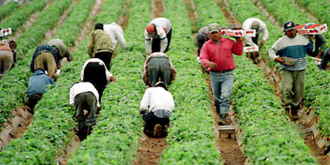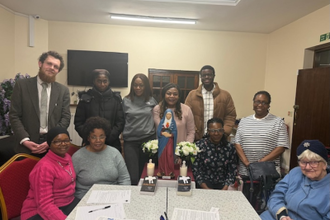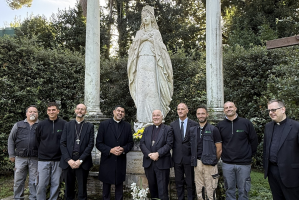El Paso Mission Trip - 3 - Farm workers are poorest of the poor

Backbreaking labour
A small group of Columban contacts in Britain spent Holy Week 2016 on a Columban Exposure Visit to the US-Mexico border. Venus Garcia-George, a youth worker based in London, shares her experience.
During Day 4 the group had a walk through the Segundo Barrio, including an enlightening stop at Sagrado Corazon (Sacred Heart) Church and its pastoral center community services, a talk from Carlos Marentes of the 'La Frontera' Farmworkers' Center, a detailed and passionate presentation on immigrants' rights from Shalini Thomas at the Diocesan Migrant and Refugee Services of El Paso, and a tour of Annunciation House refugee shelter.
Farm workers are the poorest of the poor
On day four of our exposure visit, the harsh reality of the plight of migrant farmworkers has hit hard. After a brief tour of 'Segundo Barrio' the second neighbourhood, and a detour to Bowie Bakery for preservative free goodies, we journeyed to the Farmworkers Centre, (Los Trabajadores Agricolas Fronterizos), to meet Executive Director, Carlos Marentes. This centre, the only one along the US / Mexico border, was built to support and assist agricultural workers and their families. In fact it is as a result of more than ten years of struggle by leaders and founders of Sin Fronteras Organising Project. Sin Fronteras which means 'Without Borders', is one of the most important and active farmworkers effort on the border that responds to the needs for social change.
Between July and November, thousands of workers from Mexico come looking for work. Carlos sums it up as workers selling their labour power and labour contractors buying that labour power.So what does a day in the life of a farmworker look like? It begins at two or three in the morning when recruitment of the workers take place in South El Paso. Young labourers get hired first, leaving the older workers behind. The chili pickers leave for the fields at about three o'clock in the morning and start work at about 6 a.m. They then travel to the farms, some as far as Arizona but the more popular ones are in New Mexico where 'chili' pepper is a billion dollar industry. They finish at around 4 p.m. then return to El Paso and arrive at about 6 p.m. For farm workers it is long 16 hour days.
An unjust low wage system
Chili pickers get paid piece rate for what they produce. For each bucket that is filled the farm worker receives a plastic chip to be redeemed for payment at the end of the day. Each chip is worth US$0.65 so that equates to 65 cents a bucket, the cost of one chili pepper in the UK.
In order for a picker to make at least the minimum wage, they have to fill eight buckets, about 40 pounds of chilis, which they carry on their backs to be unloaded every hour. The minimum wage is $7.25 in New Mexico. Shocking you may think. But let's take this a step further and consider the farmer who in the first day may fill 100 buckets. By day 2 or 3, he is so tired from carrying these heavy buckets and bending over to pick peppers from a 3 foot high plant, he or she can no longer fill 100 buckets. It will most likely be 30 buckets. So he earns a daily rate of US$19.50. The average annual income of chili pickers is US$6,700. Yet in the United States, a household of five is considered poor if its annual income is $20,000. Hence, the farm worker becomes the poorest of the poor.
The questions raised at that time were why do we treat farmerworkers this way? Is it because they are immigrants? The harsh reality is that farmworkers are not treated as humans but seen as cheap labour to be exploited for profitable gain. Migrant farm workers have become an invisible workforce. This injustice is further compounded with the restriction that farmworkers do not have the right to organize so they can fight for better conditions as it is a violation of international labour laws. Besides low wages, farm workers are faced with more serious problems related to their health. There has been an increase in skin diseases among chili pickers and their families but they are denied medical assistance and access to health programs. So while they provide an essential agricultural service they are not allowed to participate in the prosperity of this industry.
Carlos challenged us when he spoke of Pope Francis' message of being in solidarity with the poor. Solidarity he said is not something we do as one good deed every day but something we do 24 hours every day. He also shared with us his experience of meeting Pope Francis and the opportunity he had to take messages from the farmworkers to their papal leader. The farmworkers humbly sent blessings. Their wishes - peace and an end to violence.
The Farmworkers Centre provides a safe place for the workers to sleep, get a shower, contact their families, receive medical attention as well as attend classes to achieve a high school diploma or learn English. Most of the staff are volunteers who are committed to improving the conditions of migrant farm workers who use the centre primarily because they cannot afford to rent an apartment. Most of them cross the border from Mexico to work the fields from Monday to Friday and return home on the weekends.
Earlier blogs
Blog 1 Border control: www.indcatholicnews.com/news.php?viewStory=29710
Blog 2 Am I part of the problem?: www.indcatholicnews.com/news.php?viewStory=29727


















